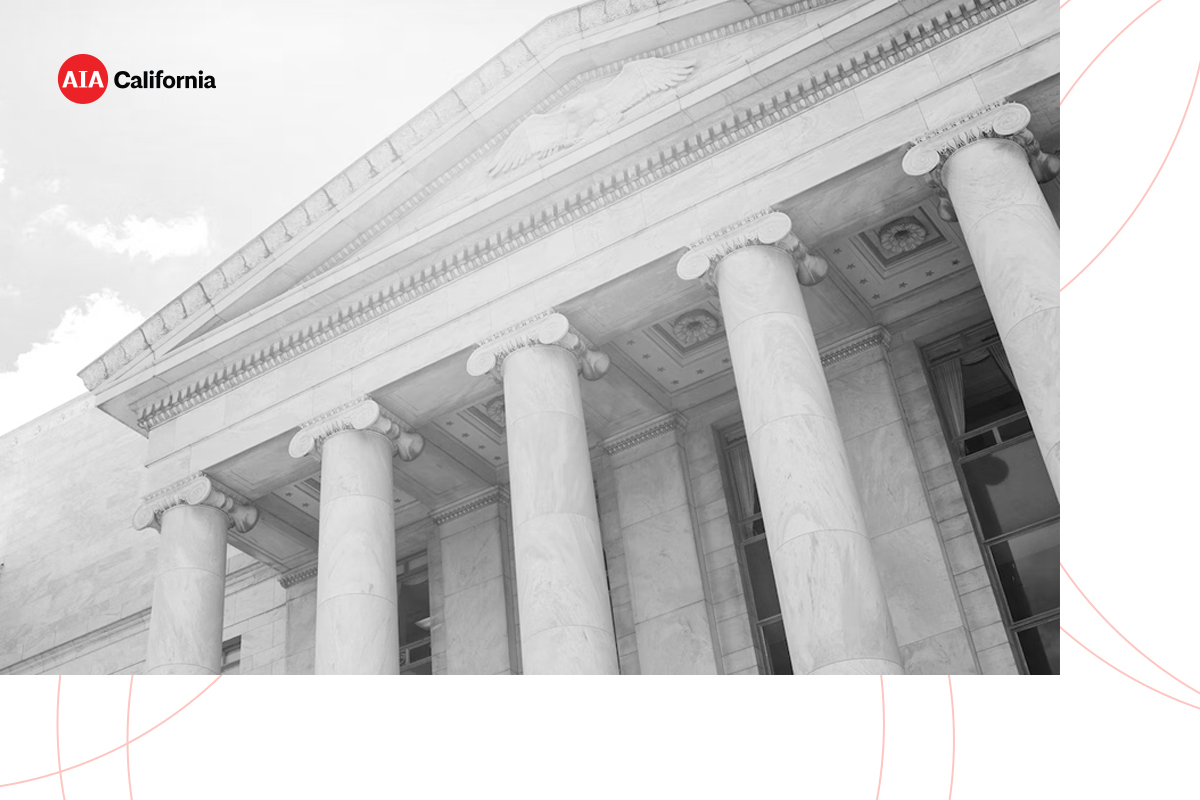
(September 28, 2022) Governor Newsom signed into law the AIA California-sponsored Senate Bill 1214 (Brian Jones, R – El Cajon). SB 1214 clearly specifies the type of information prepared by architects that local planning departments can make available to the public in a copyable format. The purpose of SB 1214 is to protect the intellectual property rights of architects as provided by the Federal Copyright Act. SB 1214 goes into effect January 1, 2023.
In recent years more local planning departments have adopted the practice of posting architectural plans for proposed projects online to help the public access information and make informed comments. This practice, however, often violates the Copyright Act. Architectural documents submitted to local planning departments includes information protected by the Copyright Act. Therefore, these architectural plans cannot be posted online, where they can be copied, without the permission of the architect.
The League of California Cities, in its April, 2017 publication, The People’s Business A Guide to the California Public Records Act, includes the following:
The PRA [Public Records Act] recognizes exemptions to the disclosure of a record “which is exempted or prohibited [from disclosure] pursuant to federal or state law ….” Under this rule, architectural and official building plans may be exempt from disclosure, because: (1) architectural plans submitted by third parties to local agencies may qualify for federal copyright protections; (2) local agencies may claim a copyright in many of their own records; or (3) state laws address inspection and duplication of building plans by members of the public.
“Architectural work,” defined under federal law as the “design of a building as embodied in any tangible medium of expression, including a building, architectural plans, or drawings,” is considered an “original work of authorship,” which has automatic federal copyright protection. Architectural plans may be inspected, but cannot be copied without the permission of the owner [of the intellectual property].
AIA California, and the architectural profession, believe the public needs to have access to information about proposed developments in order to make informed comments to local government officials. The question AIA California contemplated was how to make information available to the public without violating the Copyright Act?
SB 1214 accomplishes this.
Cary Bernstein, AIA, an AIA San Francisco Member who sits on the AIA CA Board of Directors and the AIA CA Advocacy Advisory Committee, brought the need for SB 1214 to the attention of AIA California. After Ms. Bernstein became aware that a planning department was posting her documents on a publicly accessible website, she proposed that AIA California sponsor legislation to help planning departments share information with their constituencies in a manner that does not violate the Copyright Act. Ms. Bernstein’s colleagues on the Advocacy Advisory Committee and AIA California Board of Directors agreed.
Ms. Bernstein researched the protections of architectural drawings provided by the Copyright Act, the public’s right to be aware of items under consideration by local governments under California’s Brown Act, and the exceptions for distribution of protected documents included in California’s Public Records Act, which allowed her to develop the core reasoning for new legislation. She then worked closely with Attorney Steven Weinberg, with Holmes Weinberg PC, an expert in the Copyright Act and a co-author of the Architectural Works Amendment to the Copyright Act in 1990, and AIA California staff to draft the language that was introduced in SB 1214.
SB 1214 allows architectural documents that express the scope of a project and do not contain information protected by the Copyright Act to be posted online by a planning department and copied. These documents are Site Plans and Massing Diagrams, which SB 1214 defines. Other architectural documents that contain protected information cannot be posted online or copied. These protected documents can be viewed by the public at the planning department and, of course, distributed to local government staff, advisory boards, and other decision makers.
SB 1214 protects both the owners of architectural plans and local governments through the establishment of rules on how to share architectural plans with the public, and it is for this reason, that Senator Jones agreed to author this bill and Governor Newsom agreed to sign it into law.
Importantly, SB 1214 is a good example of the AIA California advocacy program working for the benefit of Members. In recent years, several laws have been enacted for the benefit of architects that were initiated by Members. Examples include SB 704 in 2015, which made it easier for architects to serve on design review boards and planning commissions with a modification of the conflict of interest law, and AB 630 in 2013, which helped protect architects from the unauthorized use of their instruments of service.
AIA California will, in early October, conduct its annual advocacy survey for your suggestions on legislaton AIA California should sponsor in 2023. If you have any ideas, the survey is a good way to share them.